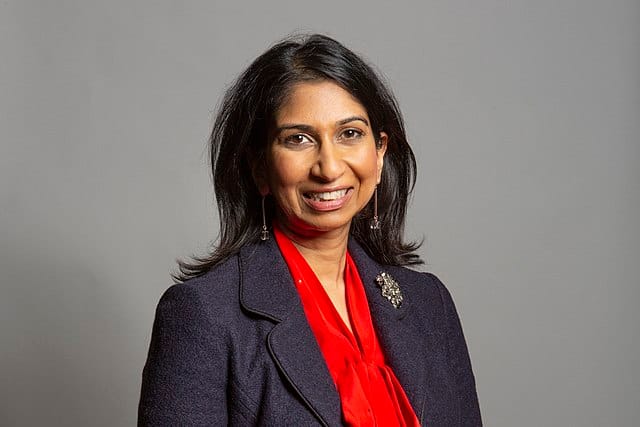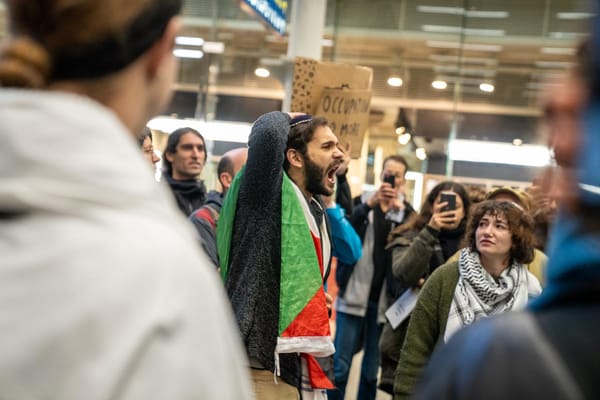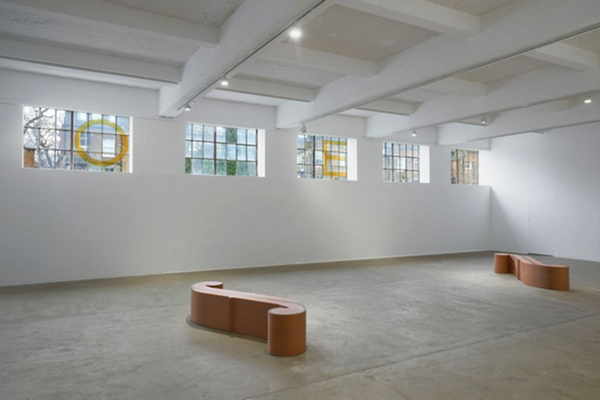Braverman v the Board
What happens when Jews won't be good?

Home secretary Suella Braverman sparked more controversy last week for remarks she made during her keynote address at the Community Security Trust’s annual fundraising dinner. In addition to announcing a £1m boost to the government’s Jewish Community Protective Security grant and the formation of a new task force for Jewish protection, Braverman used her platform to chastise the Board of Deputies of British Jews for expressing concern over her recently announced illegal migration bill – which has been widely condemned as inhumane and even illegal.
There is much here that is disappointing, not least that the CST saw fit to invite Braverman to speak at its dinner as an honoured guest. One might have hoped that the extent of Braverman’s extremist views on migration and asylum – refusing to apologise for her dehumanising rhetoric even when confronted by Holocaust survivor Joan Salter earlier this year – would at least give them some pause for thought.
In fact, large swathes of British Jewry support humane and just policies towards refugees and asylum seekers, especially in light of our own histories of flight and expulsion. Organisations like René Cassin and HIAS+JCORE have been advocating for an end to the government’s hostile environment policies for years; drop-in centres for asylum seekers can now be found in synagogues ranging from Orthodox to Liberal; and there was a strong Jewish presence at the demonstration against Manston detention centre in November last year. Yet, for Braverman, the Board taking a stand against her bill amounts to “presenting contested political positions as the sentiment of an entire community”.
While there is perhaps an element of truth in this statement – there are, of course, clear limits to the ability of communal organisations to represent the whole spectrum of opinion in the community – the fact that the Board was willing to speak out testifies to the remarkable level of consensus on this issue. And given that organisations like the Board were originally established to provide the government with a less cumbersome way to deal with the country’s Jewish population, it’s not surprising that government officials would hit back when such bodies express opposition to state policy, rather than simply being grateful for a seat at the table.
The home secretary’s disdain for opposition to her flagship policies is also reflective of a wider mentality in this government. Successive pieces of legislation have been introduced to curb our ability to criticise or challenge government policies, brazenly restricting our civil liberties and human rights. And it is customary for authoritarian regimes to pick on the weakest members of society to generate support for such agendas, scapegoating them and their supporters as the source of societal problems and diverting attention away from the people actually responsible for those conditions (the extraordinary overreaction to Gary Lineker’s recent remarks providing a case in point).
But the undertones of Braverman’s comments reveal an even more sinister sentiment. By decrying Jewish organisations that speak out against the government – in the same breath as announcing new policies for Jewish security – she is reminding British Jews that our belonging, even our safety, is conditional on our unequivocal support for those in power. It is, in essence, a loyalty test. And anyone who seeks to test Jews for their loyalty has no interest in our collective safety.
Distract and rule
This is not a new phenomenon. As outlined in April Rosenblum’s groundbreaking pamphlet The Past Didn’t Go Anywhere, those in power have often sought to position Jews as a buffer class – allowing them safety so long as they provided either a fig leaf of diversity or a shield for political decisions that entrench further violence, discord and inequality. In doing so, the ire of others affected by draconian policies is directed towards Jews rather than those who actually hold power.
Indeed, the past 13 years of Tory rule have been saturated with the politics of distraction. Where Jews have historically been scapegoated for society’s ills, today it is predominantly migrants and asylum seekers who bear the brunt: the NHS is collapsing not because of chronic underfunding and policies of austerity, but because foreigners want free healthcare; food price inflation is at 17% and people can’t afford their mortgage payments not because of economic obliteration thanks to Brexit, but because someone fleeing for their life in a dinghy across the channel wants to settle in the UK.
Despite Jews not being the primary target of this agenda, anti-migrant sentiment and anti-semitic rhetoric have become increasingly intertwined on the far right. The notion of Jews being responsible for the so-called Great Replacement of white people through a nefarious plot to accelerate non-white immigration into Europe and North America is commonplace among white nationalists; it is this conspiracy theory that motivated the shooter who killed 11 Jews in Pittsburgh’s Tree of Life synagogue in 2018.
Tragically, when Jewish communities rally in support of those forced to flee wars and persecution, this is seen by white nationalists as proof of the conspiracy. Tree of Life was targeted specifically because of its involvement in the work of HIAS to support local refugee communities, which the gunman saw as evidence of a George Soros-funded plot to facilitate an “invasion” of migrants across the US’s southern border (the same term Braverman used to describe those arriving on Britain’s shores). Clearly, then, Jewish safety is inextricably bound to the safety of other marginalised and scapegoated peoples.
Yet the abject racism of Braverman and other right-wing politicians towards migrants and refugees – while cuddling up to the CST and professing to care about Jewish safety – only serves to divide Jewish communities from our natural allies in the struggle against the increasingly authoritarian political reality in which we find ourselves. Bolstering her anti-racist credentials on the back of genuine Jewish fears about anti-semitism, while boasting that her “dream” is to deport refugees to Rwanda, not only has terrible consequences for society writ large but also represents a shallow and dangerous understanding of Jewish safety.
It is heartening to see the number of Jewish organisations that have spoken out against the government’s cruel plans for refugees, seeing our own story in their plight. Now, rather than aligning our communal interests with those who seek to capitalise on the government’s violent anti-migrant rhetoric – even if they profess to do so in the name of Jewish safety – we must build coalitions to push back against these unjust policies in order to build a multiracial, equitable and just democracy▼
Em Hilton is the UK director of Diaspora Alliance and a cofounder of Na’amod UK.
Amos Schonfield is the founder and CEO of Our Second Home and the deputy director of HIAS+JCORE.




